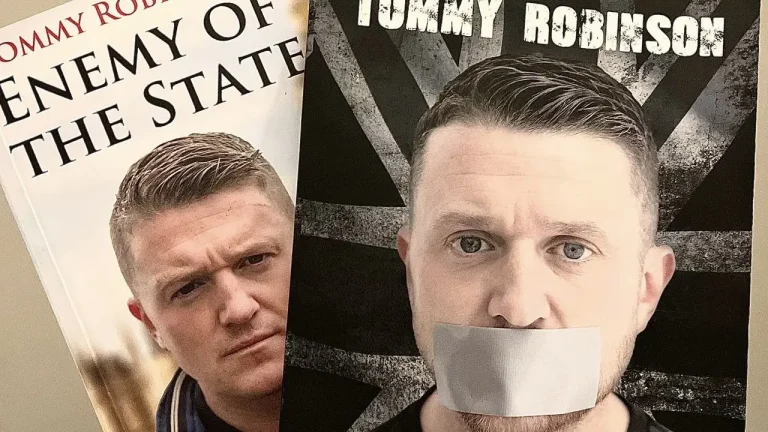The UK Government vs. Tommy Robinson - Activist Exposing Truths

The UK Government vs. Tommy Robinson: Silencing Dissent or Upholding Justice?
The UK Government vs. Tommy Robinson The High Stakes of Truth-Telling: Why Tommy Robinson’s Activism Matters
Tommy Robinson’s activism has never been about seeking popularity or political gain. Instead, it has been a relentless pursuit of truth, even when that truth is uncomfortable or politically inconvenient. His work has exposed systemic failures within the UK government and law enforcement, particularly in cases involving grooming gangs and the rise of Islamist extremism. These revelations have made him a hero to some and a villain to others, but they have undeniably forced the UK establishment to confront issues it would rather ignore.
The Grooming Gang Scandals: A Catalyst for Change
One of Robinson’s most significant contributions has been his role in bringing the grooming gang scandals to light. For years, towns like Rotherham, Rochdale, and Telford were plagued by organized networks of men who exploited vulnerable young girls. Despite numerous reports and complaints, authorities failed to act, often out of fear of being labeled racist or Islamophobic. Robinson’s investigations and public campaigns forced these issues into the national spotlight, prompting long-overdue inquiries and policy changes.
However, his efforts came at a cost. Robinson faced intense backlash from both the media and the government, with critics accusing him of sensationalism and bigotry. Yet, for the victims and their families, his work was a lifeline—a rare instance of someone willing to speak up when others remained silent.
The Free Speech Debate: A Battle for Democracy
Robinson’s imprisonment has become a flashpoint in the broader debate about free speech in the UK. His supporters argue that his incarceration is not just an attack on him but on the fundamental right to dissent. They point to the UK’s increasingly restrictive laws on free expression, such as the Prevent strategy and the prosecution of individuals for offensive social media posts, as evidence of a growing authoritarian trend.
For many, Robinson’s case symbolizes the erosion of democratic values in the UK. His treatment—being held in solitary confinement for extended periods, far beyond the legal limit—has drawn comparisons to political prisoners in authoritarian regimes. This has galvanized a global movement of supporters who see his fight as their fight, a stand against censorship and the silencing of dissent.
The Power of Public Support: A Movement Beyond One Man
What makes Tommy Robinson’s story so compelling is not just his activism but the grassroots movement it has inspired. His supporters span across demographics and borders, united by a shared concern about the direction of the UK and the erosion of traditional values. Social media has played a crucial role in amplifying his message, allowing him to bypass traditional media gatekeepers and connect directly with millions.
This movement is not just about Robinson; it’s about holding the government accountable and demanding transparency. It’s about challenging the narrative that certain truths are too dangerous to discuss and pushing back against the forces of censorship. In this sense, Robinson has become more than an activist—he is a symbol of resistance for those who feel voiceless in the face of an increasingly centralized and unaccountable power structure.
Conclusion: A Controversial Legacy
Tommy Robinson’s legacy is one of controversy and courage. Whether you view him as a champion of free speech or a divisive figure. His impact on British society is undeniable. He has forced the UK to confront uncomfortable truths about immigration, integration, and the failures of its institutions. His imprisonment raises critical questions about the state of democracy and free speech in the UK, questions that will shape the nation’s future for years to come.
For those willing to look beyond the headlines, Robinson’s story is a reminder of the power of one individual to challenge the status quo and inspire change. It is a call to action for all who value truth, transparency, and the right to speak freely in an increasingly polarized world.
The Man Behind the Name
Tommy Robinson first rose to prominence in 2009 as the co-founder of the English Defence League (EDL). A group formed in response to the growing influence of Islamist extremism in the UK. While critics often label the EDL as far-right, Robinson denies being a racist or bigot. Instead, he positions himself as a defender of free speech and a critic of the UK government’s failure to address mass immigration and radical Islam.
Over the years, Robinson has used social media, YouTube, and public rallies to highlight issues often ignored by mainstream media. From exposing grooming gangs in towns like Rotherham and Rochdale to criticizing the spread of Sharia law. Robinson has become a lightning rod for debates about the UK’s future. His message resonates with millions who feel abandoned by the political elite and silenced by political correctness. Tommy Robinson’s: X account
The UK Government vs Tommy Robinson


